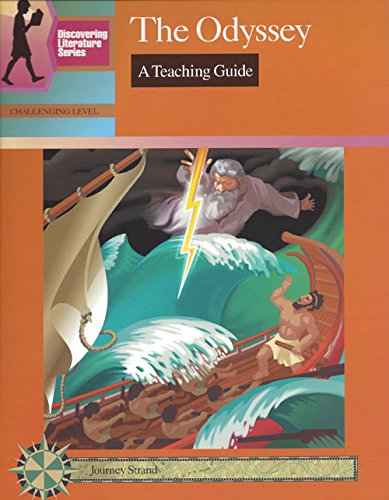


The Odyssey: A Teaching Guide: Challenging Level (Discovering Literature Series)
K**R
Just fine!
That'll work
E**E
Great Literature Guide for High Schoolers
I have used these literature guides for several other books also. The series has two levels: regular (made for middle school) and challenging (made for high school). This one, made for The Odyssey, is high school level, but so is the book itself.Each guide has a three key components: 1) chapter guides - with questions, vocabulary words, and a chapter summary; 2) lessons on literary elements; and 3) several guided writing assignments.For the chapter vocabulary word lists, definitions are included. I have the kids write them out on strips for each chapter to use as bookmarks. This gives them instant access to the meaning without interrupting the flow of their reading. Since they have to write them, it still gives them at least once of really focusing on the word. There is no way a student can learn 20-25 words per chapter when they are reading at least three chapters per week. So I pick 5 of the words per week for them to learn. These 5 words they have to engage with at least 10 times in the week. This usually works well. They also do periodic review of words learned. In the meantime, they are able to understand what they read and they increase their exposure to an expanded vocabulary.The chapter summaries are extremely helpful. They jog my memory on the particular chapter my student is reading since I'm trying to keep track of five other books also. [I'm a homeschooling grandma and former teacher.]In addition to the vocab words and the chapter summaries, each lesson has a list of about 4-7 questions. I pick one question my students have to provide a written answer for and then I choose 2-3 that I want to discuss with the students. I don't cover all the questions. The questions are very well written and chosen. They look more at the big picture, rather than, "What happen to Aunt Martha on page 17?" Nothing tricky nor minor. Nor are they only about the feelings and emotions of the reader. [Like: How to you feel about Sam's mother dying? How would you feel if your mother died? I find these types of questions extremely unhelpful and just plain traumatizing. If you are going to do a unit on death and dying and how to cope with it, then by all means, include those types of questions. Otherwise, it just leaves the child raw from having to imagine their worst fear in life and then just moving on to the next question, which is most likely trivial. And we wonder why kids now days wander around "triggered" all the time.]Sandwiched between chapter guides are lessons on literary issues like structure, themes, plots, use of metaphors, character arcs: all the parts and pieces of literature that help students perceive and grasp 1) meaning, and 2) how to accomplish such writing themselves.Ultimately, we want our students to read because we want them to be able to write and speak and communicate better. If they struggle with how a master has accomplished writing a great book, then they now have tools to begin their own writing journey. In this vein, these literature guides include several assignments that walk students through writing activities, which focus on the newly learned literary element or technique. I find them to be well chosen applications.I highly recommend these "Discovering Literature Series" guides. Before using them, make sure they, and the book you are reading, best match your student's reading, thinking, and writing level. I have not found other literature guides that I particularly like or find helpful. Most guides feel more like busy work, which I find such a waste of precious time. Multiple choice questions and asking details to find out if your student "really read the book" are pointless. 1) Teach your child to be honest, and 2) talk to your child about the book regularly. Find out what they think, and what stands out to them. What do they think is the message the author is trying to portray? Did the author succeed? Is the message or method consistent with your family's worldview? Make it a dinner time routine to talk about what is being read. Talk in the car while running errands. Go for a walk and talk. With my older kids, we would go out for coffee once a week and talk about books and thoughts and worries and dreams. Eventually, my teen would broach a topic deep on his heart and I would sit and listen and care. Sometimes we'd problem solve together. And yes, all this was in the name of "talking about a book." See how useful books are. :-) Don't fall into the short answer, multiple choice trap of triteness. Make their reading count. Make it important. Make it worthy.
K**R
It is, as described, VERY focused on "strategies" ...
It is, as described, VERY focused on "strategies" to be used to increase understanding. My kids are advanced fourth and fifth graders, so strong readers, but all these strategies just added more complexity to an already challenging book. Amazon has this listed as being for 9 to 12 year olds, but the type of analysis in this book is NOT appropriate for that age range. The guide does say "Challenging Level," but that doesn't really say much so I relied on the erroneous age listed. It would be more appropriate for maybe 8th to 10th graders.
Trustpilot
2 days ago
3 weeks ago